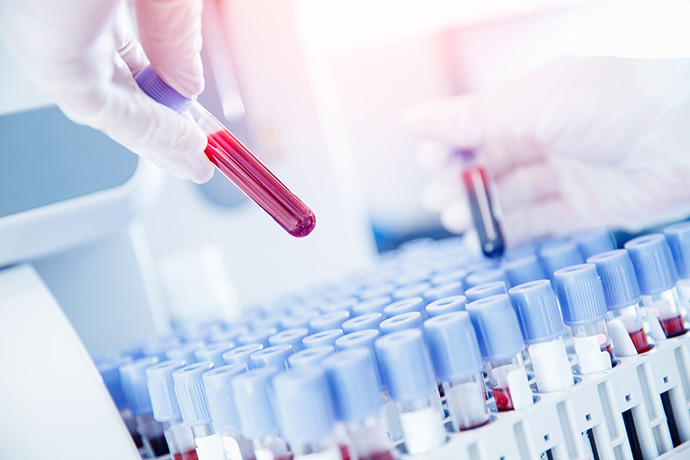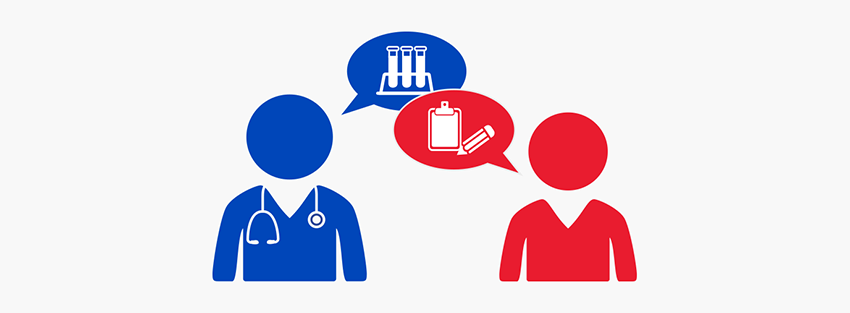If you have been feeling fatigued or have any other signs of iron deficiency such as paleness, dizziness or a racing heart, you may want to speak to your doctor. It could be that you are iron deficient but there may be another condition causing your symptoms. To get the most out of your visit it is useful to think about the information that the doctor might need in order to work out what is causing your symptoms. You could also plan the questions that you would like to ask. This section expands on the points that you might want to mention to your doctor.
Testing for iron deficiency
If you are concerned about fatigue or other symptoms, it is important that you find out for certain if iron deficiency is the reason. As well as discussing your symptoms and your medical history, your doctor may want to take a blood sample from you. Different analyses can then be performed on your blood sample. These analyses include a complete blood count to identify if you are anaemic, and other tests that check your iron levels. Different values may be used to define anaemia and iron deficiency depending on your age and gender. Click here to learn more about the tests that might be performed and what the results mean.


How is Iron Deficiency Treated?
You don’t have to accept your fatigue and/or other symptoms and adjust the way that you live; iron deficiency can be treated. Once your doctor has understood your symptoms and looked at the results of your blood tests, he will be able to confirm if you are iron deficient or have iron deficiency anaemia and recommend the best treatment for you. It may take different lengths of time for you to feel better, depending on the treatment. It is best to find out from your doctor when you can expect to notice a positive effect. One treatment option may be to increase the amount of iron in your diet by eating more iron-rich foods like red meat, liver, enriched cereals and leafy greens.1 When planning meals, this guide may help you choose food that is rich in iron.
Your doctor may also decide that you need extra iron given through:



Some treatments may be more suitable for you than others, depending on your level of iron deficiency and any other medical conditions that you may have. Your doctor will be able to discuss the treatment options available with you and advise you on the most suitable treatment option for your condition.3,5 It may take different lengths of time for you to feel better, depending on the treatment. It is best to find out from your doctor when you can expect to notice a positive effect.3,6,7 If you are having problems with your treatment and experiencing side effects, or finding that your symptoms are not improving, go to see your doctor again for advice.
Talking to your doctor
Your doctor will try to understand what is causing your symptoms. You might want to talk to your doctor about:
- How long you have felt fatigued (if applicable) and whether it is better or worse after sleeping or exercise
- Any other symptoms, including when they started, how long they last, anything that makes them better or worse and if they affect your daily life8
- Whether you have been to see another doctor or healthcare specialist or had to stay in hospital recently and if so, what was the cause of your visit8
- What (if any) medications you are on8?
- Whether you have any of the risk factors that make iron deficiency more likely, for example if you are pregnant, have coeliac disease, inflammatory bowel disease, heart disease, kidney disease, cancer, or have had bariatric surgery.
- Whether your symptoms appeared after a certain event or change in your life9
- What your everyday habits are, including whether you smoke or not, how much alcohol you drink and how much exercise you do8
- How extreme your tiredness or fatigue feels and how much it affects your daily life8

What happens next?
Depending on their assessment of your symptoms, your doctor may ask you to adjust your lifestyle and return to them for a follow up visit. Your doctor may also ask you to have a blood test.

Mit Ihrem Arzt sprechen
Wenn Sie sich erschöpft fühlen oder andere Anzeichen eines Eisenmangels auftreten, wie Gesichtsblässe, Schwindelgefühl oder Herzrasen, sollten Sie mit Ihrem Arzt sprechen. Möglicherweise leiden Sie an Eisenmangel oder einer anderen Erkrankung, die diese Symptome hervorruft. Um Ihren Arzttermin bestmöglich zu nutzen, denken Sie im Voraus an alle Informationen, die Ihr Arzt vielleicht benötigt, um die Ursache Ihrer Symptome festzustellen. Ausserdem könnten Sie alle Fragen zusammenstellen, die Sie vielleicht haben. Dieser Abschnitt geht näher auf die Punkte ein, die Sie Ihrem Arzt gegenüber ansprechen möchten.
Eisenmangel testen
Wenn Sie sich Sorgen hinsichtlich Erschöpfung oder anderer Symptome machen, sollten Sie unbedingt abklären, ob diese Symptome auf Eisenmangel zurückzuführen sind. Neben einem Gespräch über Ihre Symptome und Ihre medizinische Vorgeschichte wird Ihr Arzt vielleicht auch eine Blutprobe von Ihnen nehmen. Mit dieser Blutprobe können verschiedene Analysen durchgeführt werden. Dazu gehört auch ein grosses Blutbild, mit dem sich feststellen lässt, ob Sie anämisch sind, sowie weitere Tests zur Feststellung Ihrer Eisenwerte. Anhängig von Ihrem Alter und Geschlecht werden zur Bestimmung einer Anämie oder eines Eisenmangels verschiedene Werte herangezogen. Klicken Sie hier, um mehr über die möglichen Tests und die Bedeutung ihrer Ergebnisse zu erfahren.


Wie wird Eisenmangel behandelt?
Sie müssen sich nicht mit Ihrer Erschöpfung und/oder anderen Symptomen abfinden und Ihr Leben an sie anpassen. Eisenmangel kann behandelt werden. Nachdem Ihr Arzt Bluttests durchgeführt und abgeklärt hat, ob Sie an Eisenmangel leiden, empfiehlt er Ihnen die beste Behandlungsmöglichkeit. Beispielsweise können Sie mehr Eisen mit der Nahrung zu sich nehmen, indem Sie mehr eisenhaltige Nahrungsmittel essen. Oder Sie können zusätzliches Eisen in Form von Eisentabletten oder intravenös verabreichten Eisenpräparaten erhalten. Je nach Art der Behandlung kann es einige Zeit dauern, bis Sie sich besser fühlen. Fragen Sie am besten Ihren Arzt, wann Sie mit einer positiven Wirkung rechnen können.
Wählen Sie Ihre Nahrungsmittel sorgfältig
Wenn Sie sich extrem müde fühlen oder an anderen Symptomen eines Eisenmangels leiden, sollten Sie darüber nachdenken, ob Ihre Nahrung genug Eisen enthält. Eisenreichere Ernährung ist der beste Weg, um Ihre Eisenwerte zu verbessern und Ihre Erschöpfung zu bekämpfen. Eine gesunde, ausgewogene Diät enthält in der Regel genug Eisen, um den Bedarf Ihres Körpers zu decken. Manchmal kann es jedoch vorkommen, dass Sie trotz gesunder Ernährung nicht ausreichend Eisen zu sich nehmen. Dies ist insbesondere bei Vegetariern und Veganern der Fall. Hier ist das Risiko eines Eisenmangels erhöht. Auch wenn sich die Lebensumstände ändern, wie beispielsweise bei einer Schwangerschaft, kann sich das Risiko erhöhen. In diesem Abschnitt finden Sie eine Liste eisenreicher Nahrungsmittel und eine Liste der Nahrungsmittel, die Sie meiden sollten, um Ihre Eisenaufnahme zu erhöhen.

Nachdem Ihr Arzt Ihre Symptome verstanden hat und ihm die Ergebnisse Ihrer Bluttests vorliegen, kann er feststellen, ob Sie an Eisenmangel oder Eisenmangelanämie leiden, und Ihnen die bestmögliche Behandlung vorschlagen. Eine Behandlungsmöglichkeit besteht darin, sich mehr Eisen über die Nahrung zuzuführen, indem Sie mehr eisenreiche Nahrungsmittel wie rotes Fleisch, Leber, angereichertes Getreide und Blattgemüse zu sich nehmen.1 Dieser Leitfaden kann Ihren bei der Planung Ihrer Mahlzeiten helfen, eisenreiche Nahrungsmittel auszuwählen.
Ihr Arzt kann auch entscheiden, dass Sie auf folgende Art zusätzliches Eisen benötigen:
- rezeptfreie oder rezeptpflichtige oral verabreichte Eisenpräparate1 oder
- intravenös verabreichte Eisenpräparate2,3,4, durch die das Eisen direkt in Ihren Blutstrom gelangt.
Manche Behandlungen können für Sie besser geeignet sein als andere. Dies hängt von der Schwere Ihres Eisenmangels und anderen Erkrankungen ab, an denen Sie möglicherweise leiden. Ihr Arzt kann die für Sie in Frage kommenden Behandlungsmöglichkeiten mit Ihnen besprechen und Ihnen die Behandlung vorschlagen, die Ihrer Situation am besten entspricht.3,5
Je nach Art der Behandlung kann es einige Zeit dauern, bis Sie sich besser fühlen. Fragen Sie am besten Ihren Arzt, wann Sie mit einer positiven Wirkung rechnen können.3,6,7 Sollten Sie Probleme mit Ihrer Behandlung haben und Nebenwirkungen bemerken oder sollten sich Ihre Symptome nicht verbessern, wenden Sie sich bitte nochmals an Ihren Arzt.
- Alleyne M, Horne MK, Miller JL. Individualized treatment for iron-deficiency anemia in adults. Am J Med. 2008;121(11):943-8. doi:10.1016/j.amjmed.2008.07.012.
- Krayenbuehl P-A, Battegay E, Breymann C, Furrer J, Schulthess G. Intravenous iron for the treatment of fatigue in nonanemic, premenopausal women with low serum ferritin concentration. Blood. 2011;118(12):3222-7. doi:10.1182/blood-2011-04-346304.
- Goddard AF, James MW, McIntyre AS, Scott BB. Guidelines for the management of iron deficiency anaemia. Gut. 2011;60(10):1309-16. doi:10.1136/gut.2010.228874.
- Rodgers GM, Becker PS, Blinder M, et al. Cancer- and Chemotherapy- Induced Anemia. J Natl Compr Canc Netw. 2012;10:628-653.
- Stein J, Hartmann F, Dignass AU. Diagnosis and management of iron deficiency anemia in patients with IBD. Nat Rev Gastroenterol Hepatol. 2010;7(11):599-610. doi:10.1038/nrgastro.2010.151.
- Auerbach M, Ballard H. Clinical use of intravenous iron: administration, efficacy, and safety. Hematology Am Soc Hematol Educ Program. 2010;2010:338-47. doi:10.1182/asheducation-2010.1.338.
- Seid MH, Derman RJ, Baker JB, Banach W, Goldberg C, Rogers R. Ferric carboxymaltose injection in the treatment of postpartum iron deficiency anemia: a randomized controlled clinical trial. Am J Obstet Gynecol. 2008;199(4):435.e1-7. doi:10.1016/j.ajog.2008.07.046.
- Alleyne M, Horne MK, Miller JL. Individualized treatment for iron-deficiency anemia in adults. Am J Med. 2008;121(11):943-8. doi:10.1016/j.amjmed.2008.07.012.
- Krayenbuehl P-A, Battegay E, Breymann C, Furrer J, Schulthess G. Intravenous iron for the treatment of fatigue in nonanemic, premenopausal women with low serum ferritin concentration. Blood. 2011;118(12):3222-7. doi:10.1182/blood-2011-04-346304.
- Goddard AF, James MW, McIntyre AS, Scott BB. Guidelines for the management of iron deficiency anaemia. Gut. 2011;60(10):1309-16. doi:10.1136/gut.2010.228874.
- Rodgers GM, Becker PS, Blinder M, et al. Cancer- and Chemotherapy- Induced Anemia. J Natl Compr Canc Netw. 2012;10:628-653.
- Stein J, Hartmann F, Dignass AU. Diagnosis and management of iron deficiency anemia in patients with IBD. Nat Rev Gastroenterol Hepatol. 2010;7(11):599-610. doi:10.1038/nrgastro.2010.151.
- Auerbach M, Ballard H. Clinical use of intravenous iron: administration, efficacy, and safety. Hematology Am Soc Hematol Educ Program. 2010;2010:338-47. doi:10.1182/asheducation-2010.1.338.
- Seid MH, Derman RJ, Baker JB, Banach W, Goldberg C, Rogers R. Ferric carboxymaltose injection in the treatment of postpartum iron deficiency anemia: a randomized controlled clinical trial. Am J Obstet Gynecol. 2008;199(4):435.e1-7. doi:10.1016/j.ajog.2008.07.046.


